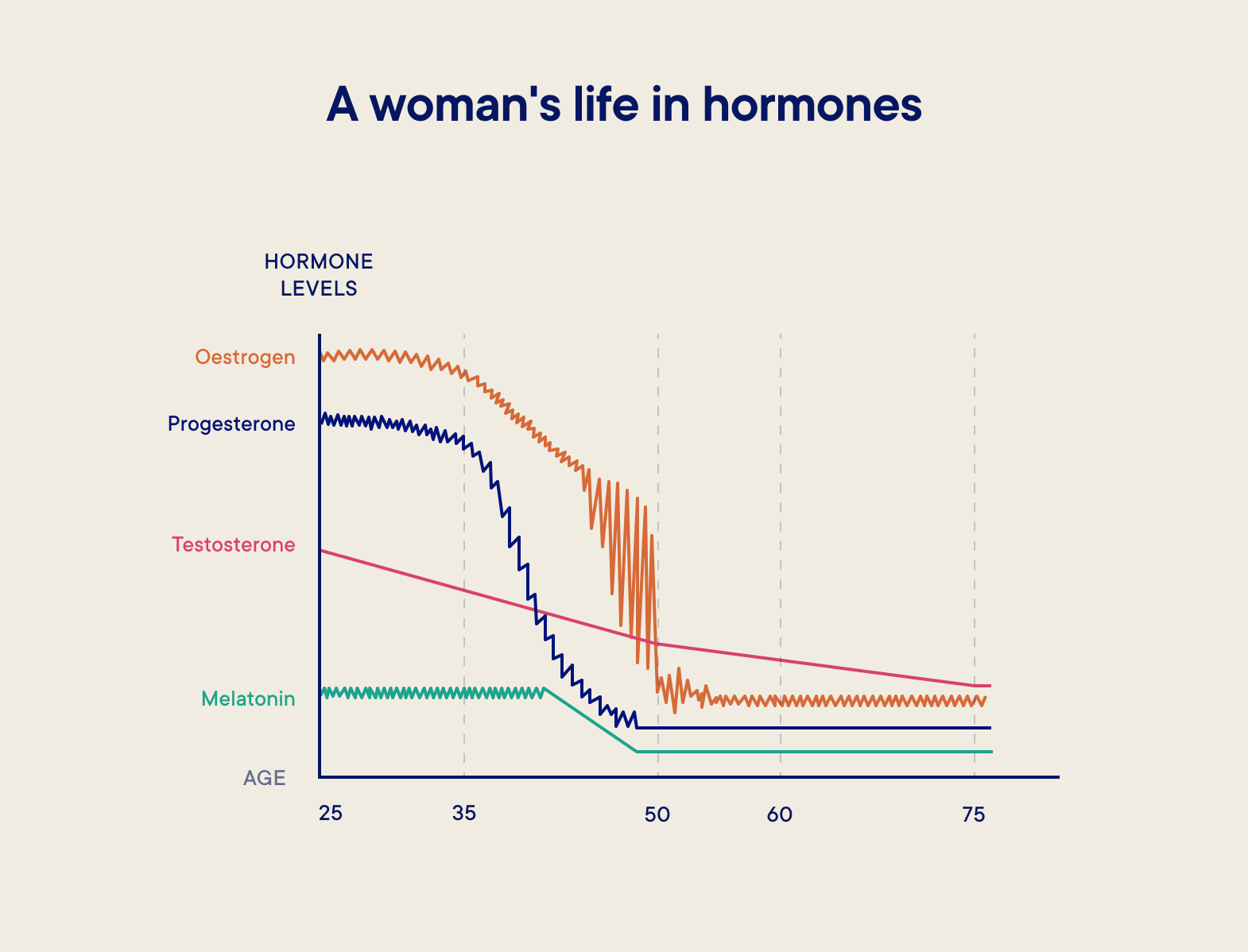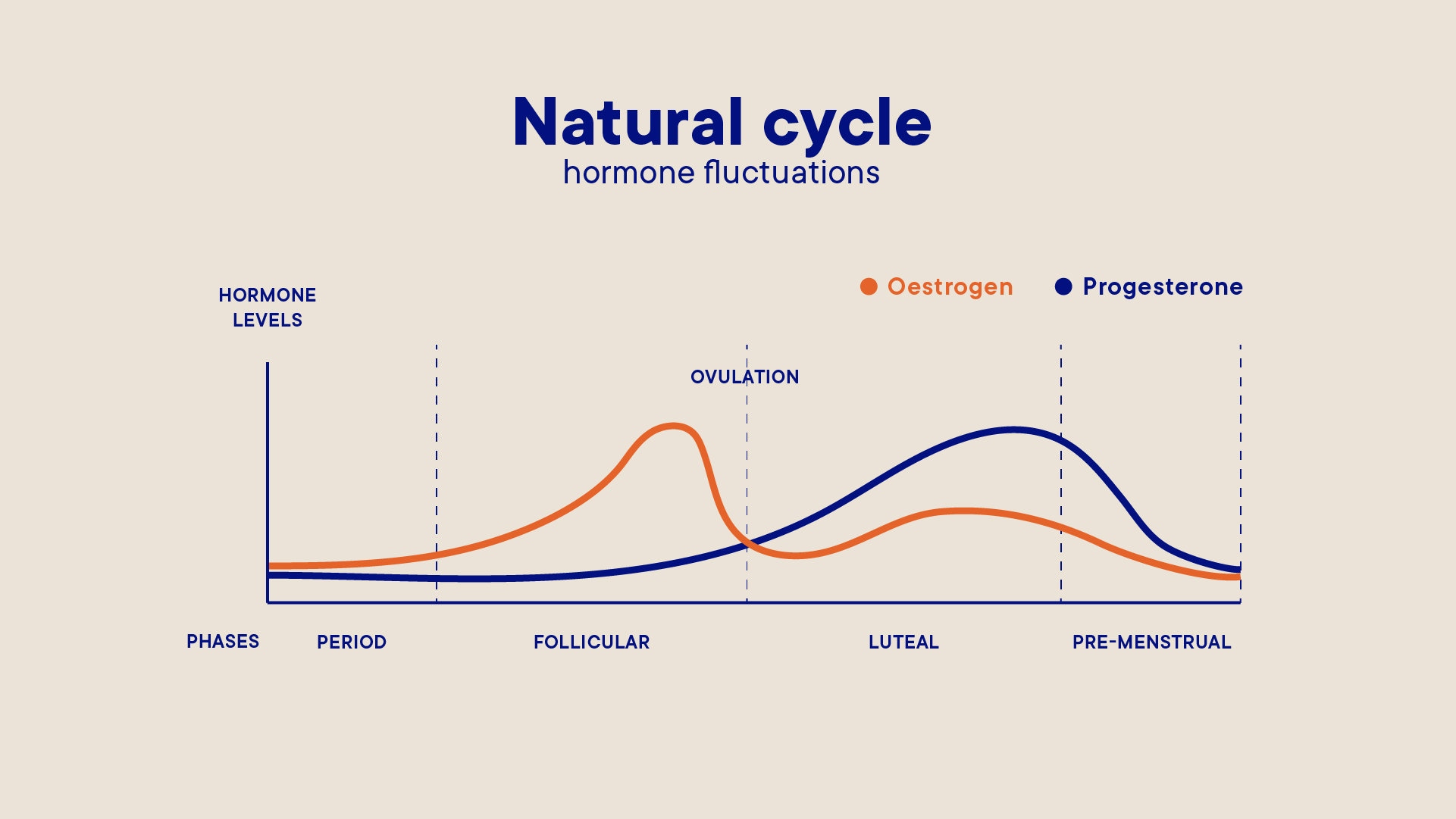What happens to your hormones when you’re perimenopausal?
5 months ago
Perimenopause5 months ago
Perimenopause
Ever wondered what’s going on inside your body during perimenopause? Here, we reveal the impact of the four big perimenopause hormone players…
Reviewed by: Dr Emma Ross and Dr Bella Smith
If your moods and menstrual cycle are all over the place and you feel like you’re dealing with lots of new perimenopause symptoms , such as hot flushes, poor sleep, irritation and anxiety, it’s natural to wonder what’s going on and what’s causing it. Here, we explain why it’s not you, it’s a hormone thing. Plus, we signpost you to the best resources for doing something about it…
In perimenopause, your oestrogen levels have gone from a regular and rhythmic peak and trough (see graph 1 below) to chaotically spiking and plummeting, with a general decline over time. It’s this erratic spike and fall that impacts how you feel and can cause symptoms such as hot flushes and night sweats, brain fog and irritation.
“It doesn’t help that oestrogen is also linked to levels of the happy hormone, serotonin, in the brain,” says Dr Emma Ross, Jennis Physiologist. “When levels of oestrogen are reduced, serotonin falls, which can make you feel low.”

“Perimenopause is the time when your hormones are slowing down and you’re getting ready to stop having your cycle,” says Dr Emma. “Because of this, only 50% of your cycles will be ovulatory (where you release an egg).”
I don’t know why society has claimed testosterone for the boys, especially when women produce three times as much testosterone as they do oestrogen during a natural cycle
“We only produce progesterone if we ovulate, so without ovulation, there is no production of progesterone. When we do ovulate, the levels of progesterone will be lower overall, hence the experience of symptoms.”
Progesterone has a calming effect on the body and brain, so a decline in progesterone can lead to sleep problems and anxiety.

Testosterone has traditionally been called ‘a male hormone,’ with the perceived wisdom that women don’t produce any testosterone at all.
“I don’t know why society has claimed testosterone for the boys,” says Emma, “especially when women produce three times as much testosterone as they do oestrogen during a natural cycle. Testosterone is a really important hormone for women and effects our bone density, muscle mass, mood, energy and sex drives.”
We’re at peak testosterone in our twenties , and it starts reducing after that, naturally declining with age. Although testosterone isn’t a key menstrual cycle hormone, it still has an impact on how we feel and the symptoms we experience during perimenopause.
Symptoms of low testosterone include:
unexplained tiredness
reduced libido
cognitive changes
hot flushes and night sweats
bone loss
reduced muscle strength
low mood and feelings of discontent and dissatisfaction (dysphoria)
The hormone melatonin is known as ‘sleep hormone’ because it’s secreted when you’re in a dark environment. It helps you sleep and regulates your circadian rhythms.
Like testosterone, melatonin levels naturally reduce as we get older, and this can upset your sleep-wake cycles. But while testosterone starts decreasing in your twenties, melatonin doesn’t start dropping until around the age of 40, according to a Dutch study .
Women at this age are often really smart, really driven and open to making changes
“Yet again, although melatonin isn’t directly linked to the menstrual cycle, the decrease of melatonin seems to happen around the time of perimenopause, so it may be linked to symptoms, such as poor sleep,” says Dr Emma.
Although all the perimenopause hormone changes taking place can sound worrying, there’s actually lots you can do to compensate for low hormone levels and the perimenopause symptoms they trigger as a result.
“I actually really like talking to women about what they can do to feel better during perimenopause,” says Dr Bella Smith, GP. “Women at this age are often really smart, really driven and open to making changes, so it’s really fulfilling to be able to talk to them about both medical and lifestyle interventions that genuinely can make a difference.”
Making sure you eat a nourishing diet, stay on top of your stress levels, and take regular exercise will make a massive difference to how you feel. You can read more detail about the best solutions for your personal symptoms here .
If you are worried about perimenopausal weight gain and bone health, there are some brilliant guiding principles and strategies for changing up how you move to complement your hormones here .
You can also speak to your GP about HRT, which replaces some of the hormones that are missing in your body.
 Cycle syncing
Cycle syncing Perimenopause
Perimenopause Perimenopause
Perimenopause Perimenopause
PerimenopauseSign up to learn everything you need to know about CycleMapping, plus how you can live better and feel better through optimising your fitness to you.
This website uses cookies to ensure you get the best experience on our website. Learn more

Sign up for the very latest news on women's fitness, health and hormones, plus be the first to receive exclusive offers and extras